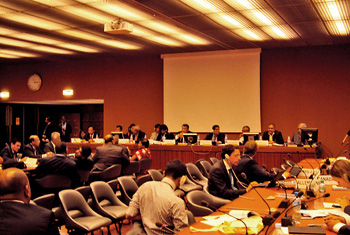
|
| By Our Political Editor |
It was 6 p.m. on Wednesday February 22 when President Mahinda Rajapaksa greeted his cabinet ministers turning up at "Temple Trees". That was first for a meeting together with electoral and district level representatives of the United People's Freedom Alliance (UPFA). Thereafter, he was to chair the weekly cabinet meeting. The telephone operator hurriedly put through a call to him. It was External Affairs Minister G.L. Peiris. He was calling from Geneva. The time in the Swiss city was 1.30 p.m. With the government's, albeit the Sri Lankan nation's, attention focused on the UN Human Rights Council, there was concern as Rajapaksa pressed the telephone receiver hard in his ears. What he heard was news that he least expected. Peiris complained that his ministerial colleague, Mahinda Samarasinghe was not 'co-operating' with him. He alleged that Samarasinghe, who is the President's Special Envoy for Human Rights did not share any documents and was functioning 'independently.'  At least four cabinet ministers who were around could not help but listen to the conversation in Sinhala. An angry Rajapaksa sternly made clear to Peiris he could not intervene in the matter. He said, as Minister of External Affairs, it was Peiris' responsibility to ensure there was rapport with his colleague Samarasinghe, and to stop whining. The latter's role was special envoy. In that capacity, he had to interact with the Permanent Representatives from different countries assigned to Geneva, delegation leaders and other diplomats at the Human Rights Council. Peiris was in overall charge as the Minister of External Affairs. In that position, it was incumbent on his part to ensure he maintained good relations, not only with delegations of foreign countries but with his own. At least four cabinet ministers who were around could not help but listen to the conversation in Sinhala. An angry Rajapaksa sternly made clear to Peiris he could not intervene in the matter. He said, as Minister of External Affairs, it was Peiris' responsibility to ensure there was rapport with his colleague Samarasinghe, and to stop whining. The latter's role was special envoy. In that capacity, he had to interact with the Permanent Representatives from different countries assigned to Geneva, delegation leaders and other diplomats at the Human Rights Council. Peiris was in overall charge as the Minister of External Affairs. In that position, it was incumbent on his part to ensure he maintained good relations, not only with delegations of foreign countries but with his own.Members of the Sri Lanka delegation led by Minister Mahinda Samarasinghe at an interactive discussion with delegations, INGO representatives and members of the Tamil diaspora at the UNHRC office in Geneva. FullStory>>> |
